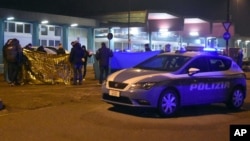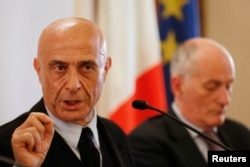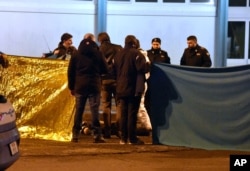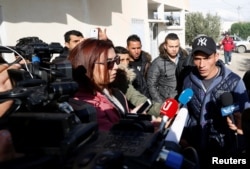An Islamic State-linked video released Friday purportedly shows the suspect in Monday's deadly truck attack on a German Christmas market calling for more attacks in Europe.
Investigators are trying to determine whether Anis Amri, 24, who was fatally shot earlier Friday by police at a Milan, Italy, train station during a routine patrol stop, received help from a network of supporters, Germany's top federal prosecutor said.
Chief Federal Prosecutor Peter Frank told reporters in Berlin that fingerprints confirmed Amri was the suspect in the attack that killed 12 people and injured 56 others. But he said the investigation was far from over.
"It's very important for us now to find out whether there was a network of supporters and accomplices, whether there were confidants who helped the sought person to prepare and conduct the attack and to escape," Frank said.
Focus on conspirators
German Chancellor Angela Merkel reiterated the investigation would focus on possible conspirators.
"If there are others who are guilty or or accomplices, we will hold them accountable," Merkel said at the Berlin news conference.
Amri does not refer to Monday's attack in the video, which was released just hours after he was killed, but it does show him pledging allegience to Abu Bakr al-Baghdadi, the self-proclaimed leader of IS.
The video was released by Amaq, the news agency linked to IS, which has claimed responsibility for the attack. Speaking on a Berlin bridge just over two kilometers from the German chancellery, Amri issues an appeal to Muslims in Europe to crush "crusaders."
"God willing, we will slaughter you like pigs," Amri says in the video. He calls on fellow Muslims to "fight for the sake of Allah. Protect our religion. Everyone can do this in their own way. People who can fight should fight, even in Europe."
The video has not been independently authenticated, but material previously released by Amaq has been credible.
Stopped at rail station
Italian Interior Minister Marco Minniti said at a news conference that Amri, a Tunisian national, was stopped early Friday by a regular patrol near the railway station of Sesto San Giovanni, a suburb of Milan.
Italian investigators said Amri pulled a gun when asked for his identification papers, then shot and wounded a police officer before he himself was killed.
Amri was a rejected asylum-seeker who had been under police surveillance following a tip he might try to buy weapons for a possible attack. But that investigation was dropped in September.
His asylum application was denied six months ago, but he could not be deported because he had no passport and Tunisia declined to accept him.
Those revelations have renewed questions in Germany about how the country vets the thousands of people who have entered the country looking for asylum. The attack has prompted talk of approving more stringent legislation on the deportation of migrants, especially those with criminal backgrounds.
Family shocked
Amri's family members said they were stunned to learn he was the main suspect in the attack. A brother, Abdelkader Amri, had urged Anis to turn himself in.
Abdelkader Amri said Anis left Tunisia in 2011 to go to Europe and might have been radicalized in an Italian prison, where he served three years for setting a refugee shelter on fire.
After leaving jail, Anis Amri arrived in Germany in July 2015. Because he couldn't be deported, he was issued a stay-of-deportation paper, which is the document police found in the truck he used in the attack.
A U.S. State Department official said two U.S. citizens were among the people injured during the attack, but no further details about those people were provided.
Before Amri emerged as the main suspect, police had detained a Pakistani man on suspicion of involvement in the Berlin market attack, but he was later cleared and released.
Earlier Friday, German police arrested two brothers who were suspected of planning an attack on a shopping mall in Oberhausen, in the West German state of North Rhine-Westphalia.
Police said the two men, aged 28 and 31, from Kosovo, were arrested on a tip from intelligence sources.
It was not immediately clear whether the men were connected with the Berlin attack.








